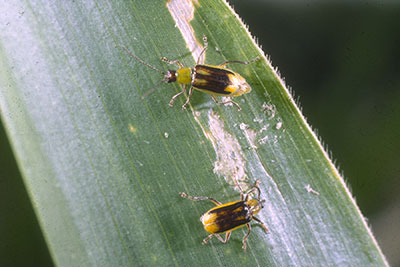 |
Western Corn Rootworm (Purdue University) |
WEST LAFAYETTE, Ind. - The only good thing that may have come from the floods in Indiana in May and early June is the reduction of crop insects because they weren't able to survive the wet conditions, said a Purdue University expert.
"Right now we're seeing extremely low numbers of corn rootworm beetles, specifically the Western corn rootworm beetle, as well as the Japanese beetle," said John Obermeyer, Purdue Extension field crops entomologist.
Obermeyer said the floods came about the time that the rootworm eggs hatch into larvae and the larvae had a very difficult time getting through the saturated soils and finding corn roots.
"The flood literally drowned them," Obermeyer said. "It seems the Japanese beetle, the grub portion of the biology, were also affected by the wet soil and possibly diseased by the fungal pathogens in the soil. So we are seeing extremely low numbers right now and I have received very few reports of concern about those insects feeding on corn, soybean foliage, even the silks."
The soybean aphid, which is typically building in numbers now in Minnesota, Wisconsin, North Dakota and South Dakota, is virtually nonexistent this year, Obermeyer said.
"All around the Midwest, entomologists have been trying to capture flying soybean aphids with suction traps to monitor their movement and had very little success," he said. "Typically the soybean aphid is brought into Indiana, Ohio and southern Michigan on a storm front from areas with high density populations in the northwest states and this year they just don't have anything.
"This normally happens from mid-to-late July and they come in big numbers and start feeding on our soybeans. This year it looks as though infestations and the need for treatment is going to be basically nonexistent this year, which is great news for the producer."
Obermeyer doesn't see how corn rootworm and Japanese beetle populations can rebound from this anemic state and expects numbers to be low for 2009, too. Don't worry though, he said, they'll be back.
Writer: Julie Douglas, ( 765 ) 496-1050, douglajk@purdue.edu
Source: John Obermeyer, ( 765 ) 494-4563, obe@purdue.edu